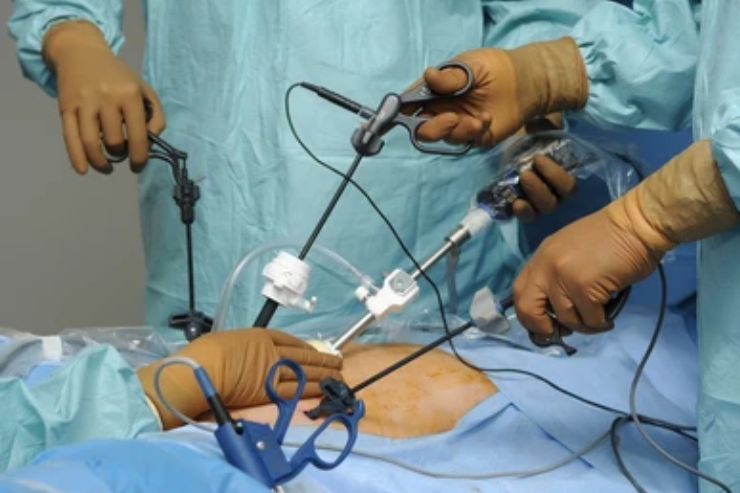
Introduction to Hysterectomy
A hysterectomy is a surgical procedure to remove a woman’s uterus (womb). Depending on the condition being treated, a hysterectomy may also involve the removal of other reproductive organs like the cervix, ovaries, and fallopian tubes. It’s one of the most commonly performed gynecological surgeries and can be life-changing for women suffering from chronic pain, heavy bleeding, or serious health conditions like uterine cancer.
Whether you’re considering this surgery or supporting a loved one through it, this guide offers complete information about hysterectomy, including the types, reasons, recovery process, potential risks, and the best hysterectomy in Gurgaon.
Why Is a Hysterectomy Performed?
Hysterectomy is typically recommended when other treatment options have failed. The most common medical reasons include:
1. Uterine Fibroids
Benign growths in the uterus that cause pain, heavy periods, or fertility problems.
2. Endometriosis
A condition where tissue similar to the uterine lining grows outside the uterus, causing pain and irregular bleeding.
3. Uterine or Cervical Cancer
Cancer affecting the uterus or cervix may require a hysterectomy as a life-saving measure.
4. Chronic Pelvic Pain
Often due to long-term infections, endometriosis, or other pelvic diseases.
5. Abnormal Uterine Bleeding
Heavy, prolonged, or irregular bleeding not controlled by medication.
6. Uterine Prolapse
When the uterus descends into the vaginal canal, often after childbirth or due to aging.
Types of Hysterectomy
There are several types of hysterectomies depending on the extent of the removal:
1. Total Hysterectomy
Removal of the uterus and cervix. This is the most common type.
2. Partial (Supracervical) Hysterectomy
Only the upper part of the uterus is removed, leaving the cervix intact.
3. Radical Hysterectomy
Usually done in cancer cases, this removes the uterus, cervix, the upper part of the vagina, and surrounding tissues.
4. Hysterectomy with Bilateral Salpingo-Oophorectomy
Removal of the uterus along with both fallopian tubes and ovaries. Often recommended for women at high risk of ovarian cancer.
Methods of Performing Hysterectomy
The approach your doctor uses depends on your condition, anatomy, and medical history:
1. Abdominal Hysterectomy
Performed through a large incision in the abdomen. It’s usually recommended when the uterus is enlarged or cancer is present.
2. Vaginal Hysterectomy
The uterus is removed through the vagina. It has quicker recovery and fewer complications.
3. Laparoscopic Hysterectomy
Minimally invasive, using small incisions and a camera to guide the surgery. Patients recover faster with less pain and scarring.
4. Robotic-Assisted Hysterectomy
An advanced form of laparoscopic surgery, offering precision and faster recovery.
Note: For best hysterectomy in Gurgaon, patients now increasingly opt for laparoscopic or robotic hysterectomy due to minimal pain and quicker healing times. Many top hospitals and gynecologists in Gurgaon offer these options.
Preparing for a Hysterectomy
Preparation is both physical and emotional. Here’s what you can expect:
- Medical Evaluation: Blood tests, imaging, and physical exams.
- Medications: You might need to stop certain medicines (like blood thinners).
- Fasting: Typically, you’ll need to fast for 8-12 hours before surgery.
- Emotional Support: It’s a major decision—don’t hesitate to seek counseling or join support groups.
What to Expect During the Surgery
- Duration: The procedure typically lasts between 1 to 3 hours.
- Anesthesia: General or regional anesthesia is administered.
- Hospital Stay: Depends on the type of hysterectomy—ranging from same-day discharge (for laparoscopic) to 2–3 days for abdominal surgery.
Recovery After Hysterectomy
Immediate Post-Surgery
- You’ll be under observation for several hours.
- Pain and discomfort are common but manageable with medication.
- You may have a catheter and a vaginal dressing.
At Home Recovery
- Recovery Time: 2–6 weeks, depending on the type.
- Rest: Essential for healing. Avoid lifting heavy items.
- Exercise: Gentle walking is encouraged.
- Diet: A fiber-rich diet helps avoid constipation.
- Follow-Ups: Attend all scheduled visits to monitor healing.
Potential Risks and Complications
As with any surgery, hysterectomy has risks:
- Bleeding or infection
- Damage to surrounding organs
- Blood clots
- Early menopause (if ovaries are removed)
- Hormonal imbalances
- Emotional changes (grief, depression, loss of fertility)
It’s vital to choose the right doctor and hospital to minimize these risks.
Life After Hysterectomy
Physical Changes
- No more menstrual periods.
- If ovaries are removed, menopause symptoms can begin immediately.
Sexual Life
- Most women resume normal sexual activity after 6–8 weeks.
- Some may feel a decrease in libido or vaginal dryness.
Emotional Impact
- Relief from symptoms may bring a sense of freedom.
- Others might struggle emotionally, especially those undergoing surgery for fertility-related concerns.
Support groups and counseling can help navigate this change.
Best Hysterectomy in Gurgaon – Where to Go?
When considering a hysterectomy, expertise, experience, and modern technology matter the most. Gurgaon is home to top gynecologists and world-class hospitals offering safe and successful hysterectomy procedures.
What to Look for in the Best Hysterectomy Clinic in Gurgaon:
- Experienced Gynecologists: Look for specialists with extensive surgical experience.
- Laparoscopic/Robotic Options: Minimally invasive techniques offer better outcomes.
- Advanced Infrastructure: Operation theaters, post-op care, and diagnostic support.
- Patient-Centric Care: Empathetic and personalized approach.
- Affordable Packages: Transparent pricing with quality outcomes.
Why Gurgaon is Becoming the Preferred Destination for Hysterectomy
- Availability of top-tier gynecologists trained in India and abroad.
- Advanced hospitals with the latest surgical technologies.
- Affordable healthcare packages compared to metro cities.
- Ease of access from Delhi NCR and surrounding areas.
Whether you need a simple vaginal hysterectomy or an advanced robotic-assisted one, the best hysterectomy in Gurgaon offers a mix of safety, affordability, and expert care.
Frequently Asked Questions (FAQs)
Q1: Is hysterectomy a major surgery?
Yes, it is considered major surgery and requires appropriate planning and recovery.
Q2: Will I go into menopause after hysterectomy?
Only if both ovaries are removed. If not, your hormones remain unaffected.
Q3: Can hysterectomy be avoided?
In many cases, yes. Medications or less invasive treatments may help. Your gynecologist will guide you.
Q4: Will I gain weight after a hysterectomy?
Some women may experience weight gain due to hormonal changes or reduced activity. A healthy lifestyle can prevent this.
Q5: How soon can I return to work after hysterectomy?
Most women can resume work in 2–6 weeks, depending on the procedure and overall health.
Q6: Care. Expertise. Trust.
Gurgaon is emerging as a top destination for hysterectomy due to its combination of highly skilled gynecologists, advanced surgical technology, and cost-effective healthcare packages. Women from across Delhi NCR are choosing the city for both minimally invasive and robotic-assisted procedures that prioritize safety and recovery. The availability of expert care and modern facilities ensures personalized treatment for complex gynecological needs.
While medical decisions like surgery require professional guidance, so do medication choices—individuals should learn more about buying amoxicillin 500 online safely, understanding that antibiotics must be prescribed and used responsibly. Whether undergoing major surgery or managing everyday health, informed choices and trusted medical support lead to better outcomes.
Conclusion
Hysterectomy is a transformative surgery that can greatly improve a woman’s quality of life. Understanding the reasons, procedure, and recovery process empowers you to make informed decisions. And when it comes to choosing the best hysterectomy in Gurgaon, you have access to top-notch facilities, skilled surgeons, and compassionate care that ensure your journey to better health is smooth and safe.
If you or a loved one are considering a hysterectomy, don’t hesitate to consult a specialist in Gurgaon to explore the best options tailored to your health and lifestyle.



